Here you can read what our students and graduates say about the Medical Electronics and Bioinformatics study programme. The interviews are translated from Czech language.
Ivana Chrtková
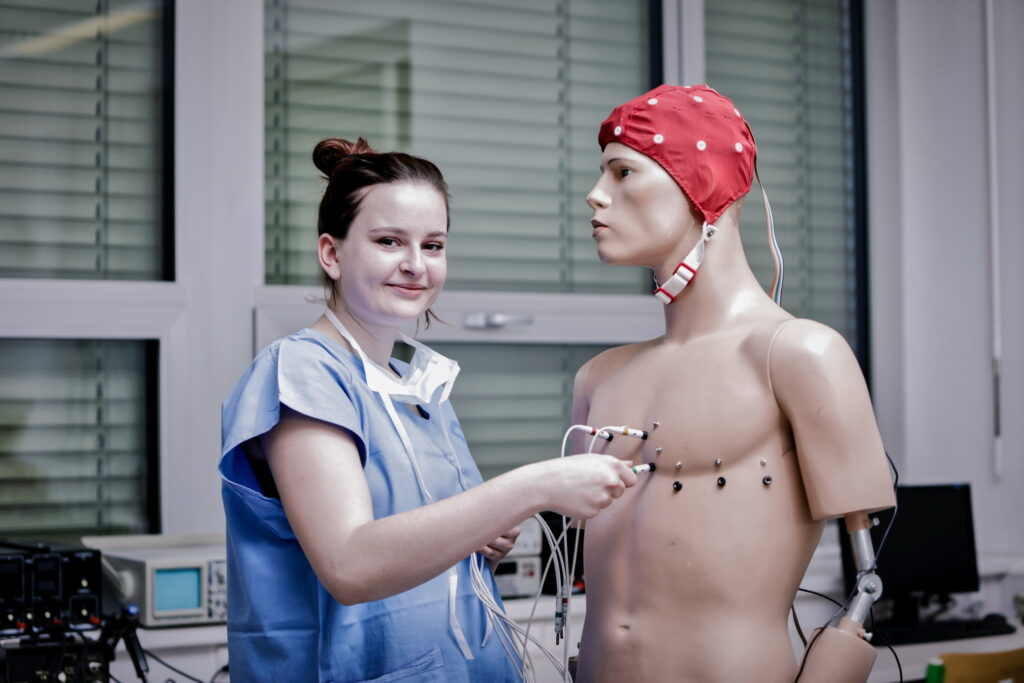
I originally went to Cybernetics but when I was about to register, a new programme Biomedicine opened up. It was a great timing because except maths and physics I also enjoyed during grammar school biology and humanities. Medical Electronics and Bioinformatics combines these subjects to a certain degree. It seems nice to me that a brain can solve something else than mathematical problems for once. We have here genetics, anatomy where we also visited autopsy room, also chemistry and biophysics awaits us. We will look into operating theatre soon. We’ve of course also had programming, which gave us a little trouble.
In the end we’ve decided along with a study colleague for tutoring. School has provided us with a room and he even got a grant for it. Most entertaining for me was however the Fundamentals of signal processing where wo would run up ECG and process it afterwards. We also worked on a porject that analysed early detection of epilepsy seizures based on EEG. I would like to focus on something concerning psychatry in the future. I would like to help schizophrenics. To find out what happens with brain during psychotic fits.
What surprised me was the amount of projects that students may partake in. We’ve had a Biomedical day where various partners and companies showed us what we can cooperate on with them. Even during the studies can we get practical orientation. A lot of people pass university, obtain a title but have no praxis. Who will employ them then?
Štěpán Hetych
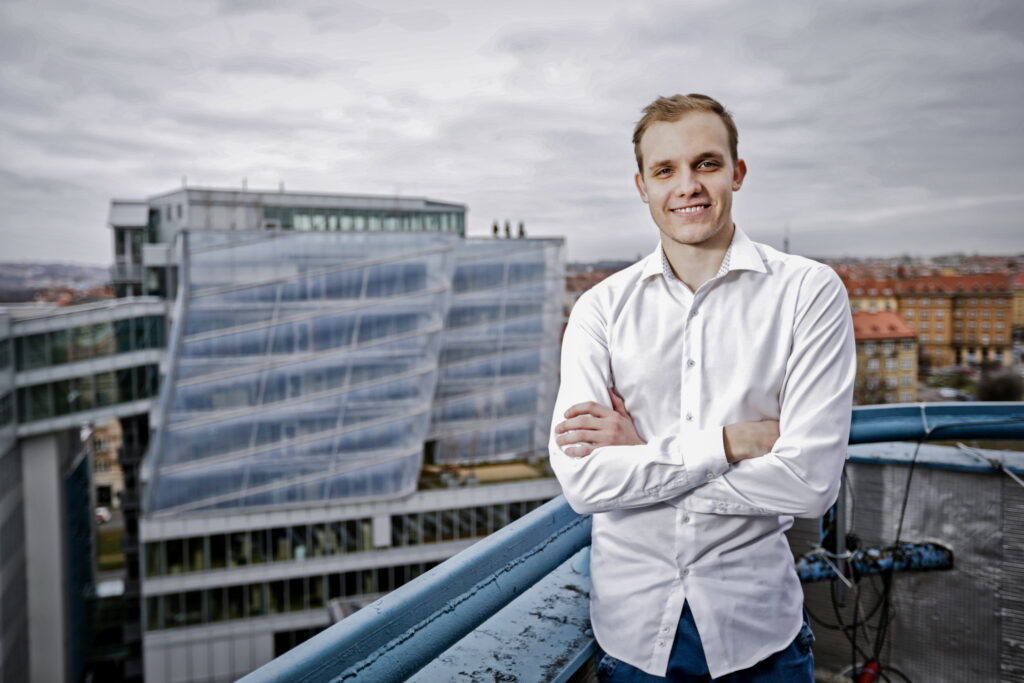
I went to the CTU deliberately, I was intrigued by the prestige of the school. I didn’t even consider anything else. It is one of the best schools in republic and surely stands up to the European competition. I had studied at electrotechnical secondary school and was thinking whether to continue what was started or try something else. I’ve heard about Bioinformatics firstly at Doors Open Day. Honestly I had no idea what I was getting into. I was fascinated by the mix of technical and humanitarian orientation as well as vast possibilities of employment in practice, whether research or development of medical apparati.
Expectations were that I would come into lecture hall and there will be 200 people. Simpy no individuality. But the practice is opposite. If a student has a problem and tells the teacher that he needs help, the lecturer may even take up a whole room and explain it to him until he understands. The helpfulness of teachers took me by surprise.
I am currently in the second year. So far we have gone through basics of various fields, especially medicinal and technical. The transformation of human body functions to electronical form etc. It has now begun to combine into one. At this time I am most interested in positive influence of stressful situations on cognitive functions, reflexes or heart activity. It works that a man is tasked with an activity such as calculating a math problem, then is put into stressful situation such as skydiving and then he does the same activity as in the beginning. One then observes not only the different execution of the task but body reactions during the stressful situation as well. Brain activity is monitored, heart activity, eye movement and even muscle activity. I would like to pursue that in the future. The reasearch but I wouldn’t mind the skydiving too.
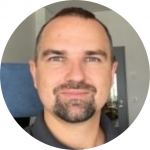
Ing. Vladimír Tvrdík
Graduated from: 2008 Biomedical engineering
Diploma Thesis: Využití neuronových sítí při rozpoznávání poruch dětské řeči
Where did you find employment in the field?
During the studies I have started to work as a technician in the operating theatre of an eye clinic and took care of eximer, femtosecond lasers, did examinations with eye coherent tomography and angiography of back of the eye. After finishing the studies I was taking care of managing medical technologies and ended my presence in eye specialization by building a few clinics in Czechia and Poland as a technical director of eight hospitals in Czechia. Now I work as biomedical engineer for foreign projects – I equip hospitals all around the world with apparati, I lead and organize courses for doctors and other medicinal personnel. I try to cooperate with Czech producers of medical technologies as much as possible.
What has FEE given you?
Except for very good professional knowledge it taught me patience, the art of solving problems, provided me with resources where to search for verified information, cope with stress, teamwork and basic presentation skills. These are very valued skills in the private sector.
What has the school not given you?
As far as the soft skills go, I’d welcome more focus on teamwork and presenation/defense of resuls. For hard skills, I’d welcome more focus on practice – e.g. what software is used for managing medcial apparati, legislation news, authorities in Czechia that manage medical resources, how to compute costs for servicing medical apparati for medical companies, producers overview, standards of apparati equipment of medical workplaces, basic hygiene regulations.
What programme would you choose today?
I’d choose the same, I enjoy my job – the field develops rapidly and it’s amazing to see the progress in individual medical apparati development.
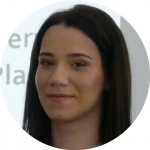
Ing. Vladyslava Čeladová, Ph.D.
Graduated from: 2010 Biomedical engineering
Diploma Thesis: Závislost srdeční frekvence na délce a hloubce dýchání (Heart rate variability)
Where did you find employment in the field?
After finishing the MAster’s phase in Biomedical engineering I’ve decided to continute with FEE, specifically at the Department of Physics and finish postgraduate studies in the area of physics of plasma. This topic seemingly does not related to the previous orientation but the topic of my dissertation thesis were Biocid effects of nonthermal plasma, which presumes own execution of fundamental and applied research in the field of plasma medicine that is a part of biomedicine. After postgraduate studies I have however decided to get back into biomedicine and now I work as a Research and Development specialist – Product Development in the company MEDICEM Institute s.r.o. Currently I pursue development of intraocular EDOF lenses WIOL-CF, which are made of the material developed by prof. Wichterle.
What has FEE given you?
I enjoyed the life at FEE despite the defficult studies. During the postgraduate I praised the fact that I have learned not to fear diffiicult matters at FEE. In my employment outside the Faculty I have realized how important it is to have interdisciplinary knowledge gained at FEE.
What has the school not given you?
I have realized the greatest disadvantage of FEE during the postgraduate studies where I found out that for plasma physics a lot of physics is required and that is not as strong at FEE as elsewhere. On the other hand a deep knowledge of physics is not the merit of most Master’s programmes.
What programme would you choose today?
When I finished the Maturia exam, I knew exactly that I want to study programme ranging betweem biology and technology and so the FEE was chosen. I realize now retrospectively that I have picked well. The field has now grown bigger so I would choose Medical Electronics and Bioinformatics. At the same time I would pick suitable elective courses even from another Faculties, perhaps with more physics.
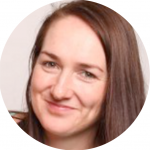
Ing. Helena Hanáková
Graduated from: 2010 Biomedical engineering
Diploma Thesis: Návrh metod zpracování EEG signálu za účelem studie vztahu svalové a mozkové aktivity
Where did you find employment in the field?
After graduating from the Master’s programme I have been employed as a biomedical engineer at the cardiology clinic – arytmology department at Prague IKEM. Before going to maternity leave it was my main activity to evaluate a longterm ECK signal, so called holter monitoring, subsequently work with stimulators and defibrilators (PM, ICD) implantation and their setting.
What has FEE given you?
FEE, respectively the university gave me a lot of friend, professional education, ability to find information from technical resources and mainly teamwork. When speaking of Biomedical engineering directly it was nice to see matters from both the technical and medicinal perspective
What has the school not given you?
I unfortunately missed more practice and perhaps more projects work during the Bachelor’s studies already where there were a lot mathematics courses and theory. I would also welcome more elective subjects.
What programme would you choose today?
I always wanted to study technical university and biomedicine intrigued me. So today I would choose the same. My job satisfies me because it combines technologies and medicine.
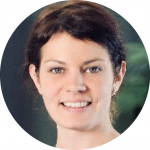
Ing. Štěpánka Říhová
Graduated from: 2012 Biomedical engineering
Diploma Thesis: Measurement of ultra weak photon emission from biological samples
Where did you find employment in the field?
I work as Sr. Product Manager EMEAC, LA, Canada; Transcatheter heart aortic valve, Edwards Lifesciences now. After graduating from the Master’s programme I took up a year Internship programme in the company Edwards Lifesciences on position of Associate Product Manager. Edwards Lifesciences is a company that focuses on reasearch, development and selling of medical apparati that specialize on cardiovascular diseases. During this time I did reporting of the market, competition data research, reports development and optimization of internal analytical software (SFDC, QV) for further Business Intelligence evaluation. Then I was for 3 years in the strategic department of the company as an analyst and a leader for specific projects (strategic planning for given business unit, forecasting, price policy transparency improvement for a more efficient process decision making, market research and follow-up analyses) – all of this for EU and Near East broader market. Gradually I’ve got the chance to partake in marketing preparation for introduction of new medical apparati within the EU market. Now I work as a Product manager with a responsibility for a specific product within a complete region (EMEA, Latin America, Canada). It is a marketing a coordination role where the main responsibility is a support of product during the entire marketing cycle (from introduction to the market to the maturity on market) including the coordination of affiliated supportive roles (operation, supply chains).
What has FEE given you?
Thank to the FEE studies I have gained a complex overview of the medical apparati market – both from the technical side (development of analytical thinking and of course technical knwoledge) and from contextual side (market regulations and laws, connections). For my job was also necessary and highly valued to know how to work with scientific articles im which I now easily orient and are now a necessity for my job; also knowledfe of principles of math modelling (which I can use now when creating epidemiological models). I also must mention IT knowledge which significantly ease everyday decision making for reporting optimazation in real practice, design of supportive software solutions, optimal logic of database structures etc. To sump it up, I am convinced that the university has provided me with a high quality technical education which is usable in real practive, necessary and most certainly eases decision making in my current job on manager position in the field of medical apparati.
What has the school not given you?
More focus and pressure towards practice is probably the way that needs to be explored during the studies’ early years. Narrow-profiled and specialized courses must be reminded in the context of potential future use – that is what I partly missed sometimes. On the other hand, the university proactively offers vast amount of options in form of certain grant and exchange programmes, thanks to which I personally had the option to look at the studies from a different and more practical perspective. It is great these options are offered to the students!
What programme would you choose today?
As far as the university education goes, I would definitely choose the same and go the way of technologies again. I enjoy discovering and applying rules, to see connections – all based on natural sciences. Biomedical engineering is very a broadscale programme withmany options of employment at the same time – i.e. for me – ideal choice!
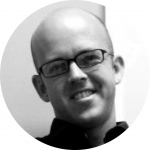
Ing. Ondřej Kučera, Ph.D.
Graduated from: 2008 Biomedical engineering
Diploma Thesis: Mechanické oscilace buněčné stěny kvasinek
Where did you find employment in the field?
During the postgraduate studies I have explored electromechanical properties of biopolymers and now I partake in fundamental research in the field of biophysics in the
What has FEE given you?
I appreciate the most the option to go out to foreign country for a study visit and gain a better overview of the field, world and life in general. It has further inspired me and moved me forward from the perspective of career, also enabled me to see research in the area of processing and image recognition.
What has the school not given you?
Even though I believe it sould be the school’s competence, I did not gain solid physics foundation at FEE or idea of interdisciplinary overlap or soft skills training.
What programme would you choose today?
I would probably choose Cybernetics and Robotics at FEE but I would also take a look in foreign countries. Except for the programme contents themselves I would also consider what are the odds of getting to state-of-the-art research at the university, what are the student clubs activities, what is the level of cooperation with application areas and range of startup activities. All of this influences the option to get to a meaningful and inspirative job.
Guarantors comment: Mr. Kučera graduated from the former Biomedical engineering. When creating new programmes we have taken similar comments into consideration. Physics fundamentals is gained by our students mainly during the Bachelor’s studies (Physics 1, Physics 2, Biophysics and Electromagnetic Field). As for the soft skills, e.g. communication and presentation skills, these may be impoved by practical training only and you may have chance for this during the studies many times. You may also register for elective courses such as Ethics, Management projet or Presentation Skills.
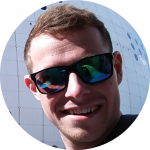
Ing. Tomáš Hrstka
Graduated from: 2016 Biomedical engineering
Diploma Thesis: Zpracování High Density EEG signálu pro potřeby inverzní úlohy v epileptologii
Where did you find employment in the field?
Even though I did not get employed in the field of Biomedicie after graduating from Biomedical engineering, I have found myself in the industry, in cybernetics and robotics as a Full stack developer in the Factorio Solutions s.r.o. company. This in my mind shows mainly how flexible graduates of CTU FEE are and may find employment nearly anywhere. Me and my company deal mainly in virtual putting into operation and Industry 4.0, the results of our work may be seen in Testbed in the CIIRC CTU building in Dejvice. Our most popular examples of Industry 4.0 are robotic bartender or barista, so stop by for a drink.
What has FEE given you?
I most certainly value most the knowledge I have gained at FEE. Combination of courses has prepared me for work in software engineering, electrical engineering and from technical part also for medicine. Surely you would also find your dream job from the job offers I get.
I can’t even omit the frienships and connection I have made over the years, these can’t be bought and open a lot of otherwise closed doors.
What has the school not given you?
I can guarantee that studying any programme of the FEE is no walk in the park, it’s often nights studied, programmed or thought through. Some cope well, others worse but if you endure and walk out as a graduate, students of other faculties won’t be able to compete with you. Some of my colleagues didn’t like that there wasn’t much space for elective courses but I never had problems with it, every programme is built as a comprehensive package of knowledge.
What programme would you choose today?
Probably the same, everything has its ups and downs. I would suggest to new students to carefully select a programme already now – to interrupt the studies and change orientation is often a senseless waste of time.
